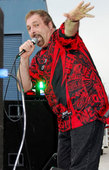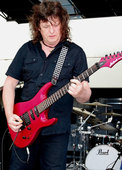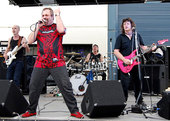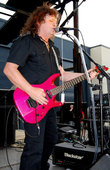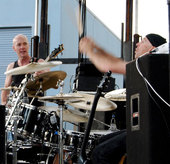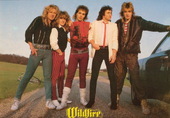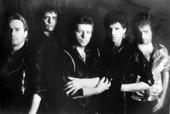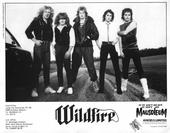Crimson Lake
We Deserve To Be Heard
26.11.2010
Архив интервью | Русская версияAustralia’s Crimson Lake have not released a single album, but our portal has already contacted their singer for an interview. Strange, isn’t it? Not at all, because this singer Paul Mario Day. It seems that he will always be referred to as “the first singer of Iron Maiden”, even though he achieved a lot in his post-Maiden career, too. He sang for More and Wildfire, the two obscure, but excellent bands, and replaced Brian Connoly in Sweet… Now Paul is an accomplished person, an specialist in web programming and design. However, he has not lost his passion for singing and eventually resurfaced in a new band…
Hello Paul! I guess there are many fans around who are very happy with you are returnning to the rock-scene! Now you have a new band called Crimson Lake. Tell us how did it all begin? Why did you choose such a name? How can you describe the material of the band?
Ever since I left England to live in Australia, I found great difficultly in finding like-minded musicians to work with. In Australia, there is very little chance to play in venues that are open to original rock music. Therefore the best option is to play covers songs from other bands. I earn a very good living playing around the country singing Deep Purple, Led Zeppelin, and various other rock artists. Early in 2009, a band saw me playing in my current cover band, Defaced, and asked me to work with them. I said yes thinking they were just another run of the mill outfit that often want me to sing for them. However, within ten minutes of singing with them and hearing their songs, I wanted this to become a permanent thing. From that point, we worked very hard in rehearsals and development of the songs. I find there is variety to the emotional content of the songs we are playing and currently recording. Each song is its own journey containing its own state of play; the album is a collection of styles each unique and different to the next. Now we have found our way.
I would describe the music of “Crimson Lake” as the music of my generation, music for my kind and me. It has the heavy rock classic pre NWOBHM emotional value to the songs of the 1970s evolving through the 1980s and 1990s. However, we all live in the 21st centaury and we do not live in a vacuum, we are touched by the nature of the beast and the way of the world around us. So they are all new songs that must live and breathe in the present day.
As far as the name, “Crimson Lake”, I have no interesting facts about the choice of the name. As in the end my love of any band does not begin or end with the name, but in the passion of their music and how it feels in my ears. The other band members came up with the name after many months of thinking about it. They are pleased with the name and I am not embarrassed by it so Crimson Lake is what it is.
You posted demos for two songs on your web site last year, but by now you have deleted them. What was the reason behind this decision?
We had advice from some friends in the industry that the demo was nowhere near as good as the album was shaping up. So under that advice we pulled the demo player on my website until we can offer some samples and tasters of the album to tempt lovers of hard rock. It has been three months since pulling the mp3 player from my site but please be patient with us. Phillip Sawyer has been very busy with other recording projects, and I will not expect to record my vocals until early 2011. We are also looking for a producer to final mix our album. I personally would like to ask Jimmy Page from Led Zeppelin to do the job as in him I trust, and I am working on that idea at the moment.
Do you already have a record deal with any label? What you can say about the recording process? When will you release your album?
Quick answer is ‘no’. It is of my opinion to look for major companies first and after the recording. Reason number one is my experience of having a small record company with the band Wildfire (Mausoleum Records) is that they do not pay royalties owed to the band and do not have the strength to make albums available for retail in the places where the band tours and works. To be successful things have to be in the right place at the right time, and for Wildfire this was not so. Reason two. At this stage in my career, I think we deserve to be heard by major companies first with the best material, recorded at its best before we settle with any compromise.
Would you try to reach a big success with your new band? What do you think about the possible future of your band and hard rock in general? Don’t you think that now this genre has become a thing for only a small group of fans?
I remember the power of the gigantic audience, the rush of adrenalin and energy. As opposed to the fear I feel in front of only a handful of people. There is no feeling on earth better than singing in front of a huge rock audience, hot and sweating for rock music. That is what I want and that is what Crimson Lake is planning, for the future. This is a big dream, I know, but I have been a long time away from music that deserves to be heard in large venues around the world and I am not at all interested in anything less.
Hard rock or heavy metal if you wish has always been for the few but it always lasts and stays vital and emotive, power for the people decade upon decade, it has always been my passion and all I want is to turn people on with my voice in the same way that others have done for me.
By the way, I have to admit that your web site looks better since you completed your design degree. Do your design your site by yourself? Tell us about your education in the university. Wasn’t it hard to study with younger people? Did your classmates know that you were a singer in the past? Did they take autographs or stuff?
University was one of the greatest parts of my recent life. Being older than most other students made me stand out in the crowd but I never had a bad word from anyone, it was a very enjoyable time. I kept my singing past to myself mostly, only discussing it with friends I had made in University at the time, I was finished with singing for 12 years and the past is best behind me then as I was retraining as a designer.
I set a four-year challenge for myself to qualify for Newcastle University N.S.W and get a University degree in visual communication. During my first year I had an assignment to make a website about myself. That was what I posted and I got a distinction mark for that effort. After University I had some time to single handedly improve my site in HTML and IU also designed a Flash site for my design services. These are the ones posted online now. However, there is a new fresh design made with new photos and information waiting for me to have time to make a full HTML site with full CSS, a process I am learning for my own interest.
You moved to Australia in 1986. Why did you decide to go there? What do you love mostly in that country?
Touring with the Sweet in 1985, I fell in love with Australia and its people. For me, the Australian way of life was free and easy, the crowds who saw Sweet play were very enthusiastic and I loved the nightlife in every major city. Sweet took part in many TV shows and interviews, and I decided that maybe I was more well-known here as opposed to England. Therefore, I made plans to make Australia my home. I felt I needed a change to widen my outlook on life.
Please, tell about your work as a video-producer. What kind of video do you produce (musical, commercial etc.)?
Years ago I found an interest in filmmaking and took a few courses in TV and film making at the start of this new century. It did not take long to realize the combination of video camera and computer was a tool I felt at ease with. Combining this with my musical history and joy of working with musicians filled the creativity that was missing in my life. There are plans to make videos for Crimson Lake at the completion of audio recording. The use of video will be in telling the story of the lyrics using the band as a tool as opposed to recording live shows on video.
Don’t you feel offended because a lot of fans know you as the first singer of Iron Maiden and disregard your other achievements?
People only know what they are told, and Iron Maiden are very well known throughout the world so it is no surprise to me that people would make that connection around the world. Iron Maiden was only the beginning and a small part of my musical life. People that heard and knew me working with Wildfire and More makes my singing life worthwhile. I consider my work more important than being only an appendix in some other band’s history. This is why I refused to be part of Iron Maiden’s DVD of their early years even though at that time I was finished with music as a performer.
What are you brightest memories about Iron Maiden? What you can say about Steve Harris?
I heard of a local band, Gypsy’s Kiss and went to see them at the Bridge House in Camden Town, East London; they were a very good band. At that time I was a motorcycle mechanic in a bike shop called Read Titan in Leytonstone, only one minute away from where Steve Harris lived. I saw Steve and some other guys and asked if I could sing with them, they said no. Later Steve came back and said he would be interested if I tried out. He told me he said no because the singer/guitarist was with them when I asked. A singer/guitarist called Dave Smith.
Some months later Steve came up with the name Iron Maiden. Some facts: I was 17, it was 1976 and Steve was 19 working as a street cleaner. He trained as a draftsman but wanted the early work so he could concentrate on his music. Other details are a little foggy about the first few rehearsals. I remember the rehearsal place was an old nunnery in Camden, a squat where Dave Lights lived. He charged us 50 pence each for the electricity we used in playing.
The first Iron Maiden show was in a church hall, I cannot remember what or where, I think it was close to Camden. It was a beginning and not many people were interested at that time. I was only with them for about six months and probably only did about a dozen shows with them. When Iron Maiden became signed to EMI I was in More about to be signed to Atlantic Records.
You said that you wrote the song “Strange World”. Did you write it entirely? Why didn’t you reserve your authority? Did you play this song on your shows with More or Wildfire?
When I was with Iron Maiden one of the guitarists came up with the music and during the jam session with the band I sang some words that I had already written many months before, and they are 98 percent the words I had written and 100 percent the melody I originated. I am still very bitter about that part of my life as I feel Steve Harris violated me and I can never prove the truth. Iron Maiden was my first band and back then I believed that people where honest and trustworthy. I also never knew I had to protect my work or how because it was my first ever song and I had plenty more to write so I never felt the need to reuse it.
While Iron Maiden was your first professional band, you did your first professional recording with the band More. What did you feel when the “We Are The Band” single was released? Did you try to prove something to the guys from Iron Maiden?
When “We Are The Band” was released as a single I was not comparing or in competition with Iron Maiden as I was signed to the great Atlantic Records, home of Yes, Led Zeppelin and AC/DC. It was my assumption that More was on the up and up with the single making it as high as 56 in the UK charts. I was happy with that position, it was enough for a no mercy hard rock band in the UK charts. I was more interested in the live work as nothing comes close to the success of turning on hundreds of people in one place at one time every night.
I felt I never had anything to prove to Steve Harris and the boys of Iron Maiden, as I know full well the world is large enough for many rock bands to live and work. We are all working for the hard rock fans around the world and it is hard enough trying to get heard over the likes of ABBA, disco and punk rock on the radio at that time. To compete against each other would just be a waste of time and to admit that you have a self-security problem with no self-confidence in yourself or your music to be driven to compete as the fastest gun in the west.
At the time I joined up with More, Iron Maiden was unsigned act and as far as I knew no longer existed so they were not on my mind at that time. So when writing the message in the lyrics to “We Are The Band”, all that was in my mind was the relationship with the band and myself working with the live audience during the high energy live performances around London at this time.
With More you sang on the first “Monsters Of Rock” festival at Donnington. Do you remember that show? What you can say about the responses from fans?
In fact 1981 was the second “Monsters of Rock” show. I went to the first “Monsters Of Rock” as a spectator; it had Rainbow and Judas Priest (my favorite band of that time) as the main acts.
Our show was with AC/DC and Whitesnake topping the bill. It was a day I will never forget - so many people shouting screaming and jumping around. Around 60,000 people watching us on stage and apparently over 100,000 were there by the time AC/DC were on stage. It was a full day starting with a police escort on the way to the show, I thought that was cool passing all the cars waiting to get in, they seemed to go for miles and miles. Plenty of my musical heroes were backstage all getting ready for their performance and partying in the hospitality tents. We had to leave the festival the minute our show ended with a police escort from the gig back to the airport to catch a flight to Germany to perform a festival later that same day supporting Iron Maiden and Motorhead or maybe Foreigner and 38 Special, somewhere in Germany. Sorry I cannot remember the details, I was so busy around that time, it was hard to remember the details, especially when you are having such a good time.
I remember the show was OK, but lacked intimacy as I was too far from the faces of the people I was singing to, I did jump into the crowd for a while and that was good. I prefer to work close with the audience as a team in making a high-energy show. The harder I work the harder they work in a chain reaction of explosive energy. I did not become as excited with the show as I would have expected. However, I remember it got good write-ups in the music press and was well received by the crowd.
By the way, bootleg recording of that show includes the song “Time Waster”. This song was never recorded by the band. What can you say about this song?
I can remember the title but I cannot remember the song. I think More dropped the song shortly after Laurie Mansworth (guitarist in the first More line-up – ed.) left the band. He mostly wrote that song and being the first to leave the band due to internal conflicts got all connections between him and the band erased as soon possible.
By the way, do you have a copy of that bootleg you can let me have? I have nothing from my past back then other than a few photos as I have traveled and moved so many times I have lost many things from my past. Things like tour passes, autographed programs. I have no demo recordings or my old copy of “Blood and Thunder” (More’s second album released in 1982 after Day’s departure – ed.) with my words and melody on as they were all on cassette all lost and broken, lent out and never returned.
Is it true that you left More due to personal problems with Kenny Cox, the band’s guitarist and thunder? And please clarify – is Brian Day, More’s bass player, your brother?
Kenny Cox was a volatile man, and very hard to work with, behind the scenes we all did not get on very well with him for a long time. He also robbed us all from within as we later found out. I mentioned earlier Laurie Mansworth left a little before the “Monsters of Rock” festival due to Kenny Cox taking all the writing credits from him and keeping them for himself. In hindsight it was my fault to let him get away with this but I was sure that justice would win in the end, silly me. This hit me hard as all of my parts lyrically and melody was deleted from the second album, “Blood and Thunder”, and replaced quickly and badly by the new singer and Cox, disallowing any possible chance of getting any credit from More. Thus greed made a potentially good follow up album that could have made More into a bigger act, a disappointment for the fans and Atlantic Records. Still to this day I have not received any money from More for writing the first album. Nor has Brian, Frank, Andy, and Laurie and we have no chance of any. We all live and learn.
As far a Brian Day is concerned, it was just a coincidence about our last names. He is no longer living amongst us and he will be missed dearly. He was a really good guy who was a friend and a wonderful musician. He left a few months after myself for the same reasons above.
Your next band was Wildfire. How did you get to know the other members? Why did you sign with Mausoleum Records? Don’t you think now that it would have been better to wait for a while and sign with a bigger label?
I knew Martin Bushel, Wildfire’s master lead guitarist with the Gibson Flying V, in my earlier singing days between Iron Maiden and More and admired his playing style very much so I contacted him to start a new band after I parted company with More. We spent the first few months writing new songs. After which, we made a demo with a few of Martin’s musician friends (I do not have this demo either). With this demo - “Redline”, “Wildfire”, and I think one other song - I went to visit some close friends in Maasmechelen close to Genk, Belgium who were big More fans. They set up a meeting with Alfie Falckenbach of Inleco records. He liked the songs very much and offered me a chance to record an album in Brussels. I knew I had no full band at this time but the chance of finding good players within two months would be better with a chance of recording an album. Writing four more songs was an exciting challenge I could not refuse. There was an opportunity and I took it. When I discovered later that there would be no support from the record company such as no tour funding or albums sent to record shops in all the towns we played on tour, I realized it would have been better to wait for better offers to come.
The song “If I Tried” from “Brute Force…” LP starts off with your singing the words to Simon & Garfunkel's “Scarborough Fair”. How did you get this idea?
There was no plan to this intro; it was only a recording soundcheck after getting tired of saying “one two, one two” over and over again and making silly noises. I came out with it for something to do while getting my sound. During mix down of “If I Tried,” John McGowan the engineer and myself in the role of producer decided to include it on the album before the song, as it seemed to suit the emotion of the track. I tried to sing it better but it never sounded as sincere as the unexpected version.
Wildfire had its own style and very strong catchy songs. Why didn’t you reach a bigger success? Is it all because of poor support from label?
The short answer is “yes”, we never got the opportunity to work hard or long enough, we lacked effective promotion. As a band of talented musicians we were young and had no marketing skills of our own and we never found anyone who could help us propel to a bigger audience. Having Mausoleum Records also hindered us finding a manager, as there was no money on offer to pay anyone worth having in this highly competitive business. So all we did was to muddle along as best as we could. Along the way we got help from people but never as big or as much as I would have liked. From then till this day I will not have anything to do with business unless I am properly represented. I only concentrate on Words, Melody, Sound and Performance, that is enough for any human being I think.
Please, tell us how you worked on lyrics? What influenced you? What lyrics are you most proud of? Maybe it’s “Passion For The Sun” off Wildfire’s “Summer Lightning”, which is my favorite?
Thank you for saying that, I appreciate your comment. I am proud of that song as a song that is more than words only. From 1981 to present time my favorite band is Rush, and I suppose Neil Peart writes the most effective lyrics in my lifetime. Also, other giants who have inspired me earlier like Black Sabbath, Judas Priest, Queen and Deep Purple. I have never been a fan of sex drugs and rock and roll in rock lyrics. I am always fascinated by the internal explorations of the human mind, and Neil Peart with Rush in my opinion accomplishes this the best. The thing we all think, feel and hope for is something we all share in secret mostly, and in music and words we are reminded we are not the only one that feels.
I am not proud of any of my words to date as I try my best to write words that I can and would like to hear. However, they become too personal and I never get the chance to hear them for the first time and because of this I lose my objectivity. I am always changing them until the day they are recorded and after then it is too late to change them as they become locked in stone forever. There are always regrets and the wish to do better is strong as with all other things.
My way of writing is to jam with the band or other musicians to find the best melody while always recording this in case any good idea is forgotten. This is to get the heart to find words at the same time as a melody. Then after reaching the best job I can, I then put my head to work, using my experiences and influences to hone the work to something that pleases me. I work believing I should be the first person to like the words before I expect anyone else to.
On the second Wildfire album “Summer Lightning” you worked together with producer Guy Bidmead who better known for his work with Motorhead and Warfare. Albums of these bands sound very rough but “Summer Lightning” sounds pretty elegant. What you can say about your collaboration with Guy? Did he bring something new to the band?
The recording part of the album was collaboration between Wildfire and Mick McKenna, who is the in-house engineer of the Rolling Stones mobile we used for the recording of “Summer Lightning”. The band set up in a green house at Shepperton Studios (a large movie making complex in London) for the backing tracks while I was singing the guide vocals in the Rolling Stones mobile. We knew what we wanted as we rehearsed and played the songs for a year. I believe the recording process of an album is the most sensitive part. The most conflict arrives in the performances and what stays or what is cut out. Guy arrived for the mix down stage sessions only so I never really got close to him. If Guy was part of the actual recording process from the start it may have been more live in feel and production. I think the band was progressing towards a more polished and produced stage in sound. I personally would have preferred a harder exciting sound for the band and a little less 80s in the drum sounds.
Please tell us your brightest memories about touring with Wildfire. What concert do you remember as the strongest?
The brightest memories of Wildfire is the whole Wildfire experience, the band members are still very good friends and I have the utmost respect for them as players and people. Recording both albums was such a good time and pleasure for me. As far as the live side, it is playing “Jerusalem” and “Natural Selection” live on English TV The Tube on Channel 4 (can be found on my web site). In addition it was a buzz working alongside of Phil Lynott and Gary Moore playing “Out In The Fields” on stage after our performance.
Supporting Hawkwind on a UK tour in 1984 was also a big moment for Wildfire except there were no albums on sale in the record shops at every town we played and having so many people asking how to get the album and not being able to help them get them was a disaster to our confidence.
NWOBHM is now considered as revolution in rock music. What do you think about it? Did you feel that you were making history at that time?
For me the rock never went away or came back. Ever since hearing the first Led Zeppelin album, Deep Purple “In Rock”, and Black Sabbath’s title track I am never tired of listening to hard rock. Of course bands like More, Saxon, and Iron Maiden came through in the early 80s. But this wasn’t new, it was only the media finding something 20 years old and calling it new again.
It just seems to be getting harder to find good rock bands in the record stores before NWOBHM came along, but they were always out there. I was out on the streets in London in the mid 70s hearing new unsigned hard rock bands all the time in pubs. They are still out there, getting overlooked by the music press and media.
We were not making history; we were part of it, living day to day wanting bigger audiences, radio and TV coverage, live shows and playing every country on this good earth, rocking the crowds. We ate, drank and fought for the rock; we lived for it then and live for it now. We always looked forward and never back in the rear view mirror, it was the future we were thinking of, not what we left behind or to see where we had been or what difference we made.
After Wildfire’s break-up you became a singer of Sweet. How did it happen? Do you like their music? What Sweet song did you like to perform most?
Wildfire was working less and less and we were all getting low, thinking that in the prime of our lives we were not doing as well as we should. Doing about one show every month was killing us. I started auditioning for other bands, as I was still hungry to sing. Without knowing it I got a chance to sing for the Sweet. I got picked out of more than 300 singers, to tour in Australia with only three weeks to prepare. I made the choice and spent the next 3 months touring Australia with Sweet. I had the biggest time of my singing life, getting good money, food, hotels and flying everywhere, radio and TV interviews. The nightlife was a great ride, everyone knew me, and it was a terrific ego boost. It was what I wanted all of my life to get the chance to work and play hard, but they were not my songs.
My favorite Sweet songs were, “No You Don’t”, “Burn on the Flame”, and “Action”. Basically any song was fine, I did not care as long as the crowd loved it and I always loved the crowd. Andy Scot and Mick Tucker were truly great musicians everywhere I played with them, also there were the stand in musicians of Sweet; Phil Lanzon (Uriah Heep) on keyboards and Mal McNulty (Slade) on bass completed the 1985-1986 Sweet line-up. This version of Sweet was a very hard version of an old glam rock band, I would say because of my singing style and performing ideals.
You also contributed three studio songs to “Live At The Marquee”. Did you have any plans to continue working with Sweet? And why did you leave the band?
During the second tour of Australia six months after the first in 1986, I realised Sweet was only a cover band as far as my part in it was concerned. The songs I had composed for Sweet were not as well accepted as the famous ones and the band was not really a hard rock band. I had admiration for them, however, it was not for me and I decided to live and marry in Australia and experiment with a new life there.
Your voice is fulfilled with happiness and brightness when you sing. What makes you carry such emotions with your singing?
I love singing for people, always have and I have hard rock in my veins, you will not find me singing only for myself, as that means nothing to me. I know I do my job well, and I consider myself a shy person in my private lifeб. I am the Dr. Jekyll and Mr. Hyde of rock. So I must sing the way I love to or give it up. I did finish with singing for 12 years because I could never find the musicians to work with until now. Singing well is my ego; singing with all my conviction is the only way. Making people feel good with my voice is my shield against shyness. It is the power and glory only when I work with and for people in the music I love. Outside that I am only an ordinary man. Believe me, Crimson Lake is here and I am back.
Please, say a few final words for your Russian fans.
Thank you for giving me the opportunity to connect with you and for giving me your time to get to know me. I dream one day to be able to see your country and cities. To discover your nation and personality face to face. To be able to share in your hopes and dreams and stand in between a rock and a hard place rocking.
Crimson Lake on the Internet: http://www.paulmarioday.com
Konstantin “Hirax” Chilikin
November 14, 2010
© HeadBanger.ru
